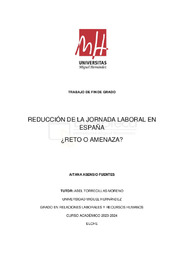Please use this identifier to cite or link to this item:
https://hdl.handle.net/11000/33705Reducción de la jornada laboral en España ¿Reto o amenaza?
| Title: Reducción de la jornada laboral en España ¿Reto o amenaza? |
| Authors: Asensio Fuentes, Aitana |
| Tutor: Torrecillas Moreno, Abel |
| Editor: Universidad Miguel Hernández de Elche |
| Department: Departamentos de la UMH::Ciencia Jurídica |
| Issue Date: 2024-09 |
| URI: https://hdl.handle.net/11000/33705 |
| Abstract: El propósito de este trabajo es realizar una investigación acerca de la nueva medida que pretenden conseguir el gobierno de coalición compuesto por el Partido Socialista Obrero Español (PSOE) y el partido Sumar, sobre la reducción de la jornada laboral en España, implantandola así de forma gradual, comenzando por reducirla a 38.5 horas semanales desde finales de este año 2024, y a 37.5 horas semanales a partir de principios de 2025. Además, la idea principal es investigar acerca de las distintas opiniones que ha generado esta posible nueva medida, puesto que ha causado que una parte de la población española considere que esta medida va a ser beneficiosa y otra parte de la población cuestiona todos los riesgos que van asociados a la misma. A su vez, también analizaremos cómo las distintas opiniones pueden ir asociadas a factores como puesto de trabajo, cargos o funciones que estas personas desempeñen. De esta forma, hemos realizado encuestas a 44 individuos procedentes de distintos ámbitos laborales y sociales como trabajadores por cuenta ajena, empresarios, profesionales independientes, profesionales con trabajadores a su cargo, o estudiantes. El motivo de la elección de este tema es poder averiguar cuáles pueden ser las razones y los motivos de no existir unanimidad respecto a esta nueva medida. Así como hacer un estudio detallado de todos los beneficios que se considere que esta nueva medida pudiese generar como sus inconvenientes y los resultados que puedan influir en distintas variables como la producción, el diseño de la organización o la tasa de empleabilidad. Tras analizar los datos de las encuestas, se ha podido constatar que en general, los datos sugieren que existe un apoyo significativo a la reducción de la jornada laboral, con la mayoría de los encuestados creyendo que tendría un impacto positivo en la productividad, el bienestar de los trabajadores y el desarrollo sostenible. Sin embargo, también existen preocupaciones sobre los posibles retos y desafíos, por lo que se recomiendan medidas complementarias y una implementación gradual y adaptada. The purpose of this work is to carry out an investigation about the new measure that the coalition government composed of the Spanish Socialist Workers Party (PSOE) and the Sumar party intend to achieve, regarding the reduction of the working day in Spain, thus implementing it in a gradually, starting by reducing it to 38.5 hours per week from the end of this year in 2024, and to 37.5 hours per week from the beginning of 2025. Furthermore, the main idea is to investigate the different opinions that this possible new measure has generated, since it has caused a part of the Spanish population to consider that this measure is going to be beneficial and another part of the population questions all the risks that are associated with it. At the same time, we will also analyze how different opinions can be associated with factors such as job position, positions or functions that these people perform. In this way, we have carried out surveys to 44 people from different work and social fields such as employees, entrepreneurs, independent professionals, professionals with dependent workers, or the unemployed. The reason for choosing this topic is to be able to find out the reasons and reasons for there being no unanimity regarding this new measure. As well as making a detailed study of all the benefits that are considered that this new measure can generate, as well as its drawbacks and the results that can influence different variables such as production, organizational design or the employability rate. After analysing the survey data, it has been found that in general, the data suggests that there is significant support for reducing working hours, with the majority of respondents believing that it would have a positive impact on productivity, well-being of workers and sustainable development. However, there are also concerns about possible challenges, so complementary measures and a gradual and adapted implementation are recommended. |
| Keywords/Subjects: jornada laboral medidas riesgos beneficios conciliacion |
| Knowledge area: CDU: Ciencias sociales: Economía: Trabajo. Relaciones laborales. Ocupación. Organización del trabajo |
| Type of document: info:eu-repo/semantics/bachelorThesis |
| Access rights: info:eu-repo/semantics/openAccess Attribution-NonCommercial-NoDerivatives 4.0 Internacional |
| Appears in Collections: TFG - Relaciones Laborales y Recursos Humanos |
.png)

